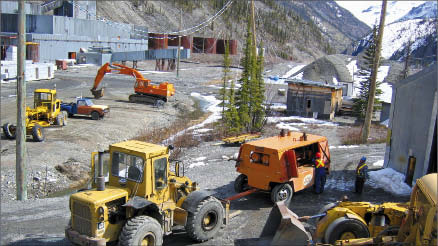Two recent news items have underscored the divergent futures of the Northwest Territories (NWT) and Canada’s other two territories. On one side, BHP Billiton (BHP-N) announced possibly selling its Ekati diamond mine in the Northwest Territories since the mine does not provide the long-term prospects required by the company. Across the territorial line, Nunavut announced a new royalty trust for the billions in revenue it expects from new mines in coming years.
The announcements point to a shift in northern mineral prosperity: the Northwest Territories are struggling while Nunavut and Yukon are booming. Exploration spending in the NWT has gone in a few years from competitive with the other territories to far behind.
“We’re in a difficult situation because we’re book-ended by the Yukon and Nunavut,” recently appointed NWT Premier Bob McLeod said during an interview in Vancouver, where he was promoting the NWT and attending the Grey Cup football game. “Historically, Northwest Territories always had the most resource potential and the most exploration, but the Yukon and Nunavut have overtaken us.”
In 2006 the NWT had $176 million in exploration and deposit assessment spending while Yukon had $106 million and Nunavut $210.6 million. This year the NWT is expected to see $82 million while spending in Nunavut should top $396 million and in Yukon, $309 million.
The reversal of mining fortunes has had direct impacts on these mining-dependent regions. According to the Conference Board of Canada, Nunavut’s gross domestic product (GDP) is expected to grow 15.7% this year and Yukon is expected to grow 5.9%, while the NWT’s economy is expected to contract by 2.3%, owing to falling construction and a stagnant mining industry.
Facing those starkly contrasting numbers, Premier McLeod has taken the helm of the NWT legislature. McLeod says that there are challenges in the NWT that the other territories don’t necessarily face, and he’ll be working to balance the scale during his tenure.
For one, Yukon has obtained devolution on land, water and resource management, something the NWT has come close to several times but has not yet achieved. The lack of local control adds layers of bureaucracy and limits the NWT’s response to industry needs.
“Almost every one of the mining projects are looking for assistance with infrastructure and cheaper power. Unless we have devolution, we don’t have any way of going and saying, ‘yeah, we’ll work out these deals,'” McLeod says.
The NWT has been on the verge of achieving devolution for years now, but a lack of consensus and aboriginal settlements have pushed devolution back.
“Twenty years ago we thought devolution was on the horizon,” McLeod says. “We’re still waiting.”
The NWT has settled land claims with the Tlicho, Sahtu and Gwich’in First Nations, but the large Deh Cho and Akaitcho regions in the southern part of the territory remain unsettled. In the Yukon, 11 of 14 First Nations have settled while Nunavut, with its largely homogenous population, is covered by a 1993 Nunavut land claims agreement.
Companies continue to advance projects in the NWT but, in both settled and unsettled regions, the process requires time and commitment.
This year Avalon Rare Metals (AVL-T, AVL-X) signed three preliminary agreements with the Akaitcho First Nations for the company’s Nechalacho project, despite the fact that the region does not have settled land claims.
Fortune Minerals (FT-T) has kept its polymetallic Nico project moving forward, and in November signed an agreement with the Tlicho government that establishes a framework for more negotiations. Fortune has committed to funding a traditional knowledge study that will be incorporated into its ongoing environmental review.
But the Nico bismuth-cobalt-gold project, which Fortune discovered in 1996, also underlies the North’s continuing challenges. To save costs, the company has opted to move the hydrometallurgical part of the processing plant to near Saskatoon, Sask.
McLeod says that the NWT can’t compete with Saskatchewan’s power costs of 5¢ per kilowatt hour, with the cheapest power in the NWT at 16¢ per kilowatt hour in Fort Smith, and even more expensive continuing north.
“That’s the kind of situation we find ourselves with,” McLeod says.
But along with Fortune’s and Avalon’s projects, Canadian Zinc (CZN-T) is finally moving ahead with its Prairie Creek silver-lead-zinc mine, Seabridge Gold (sea-t, sa-x) advances its Courageous Lake gold project, North American Tungsten‘s (NTC-V) Cantung mine is operating, and of course diamonds still hold promise with Anglo American subsidiary (AAUKY-Q) De Beers‘ and Mountain Province Diamonds‘ (MPV-T, MDM-X) Gahcho Kué diamond project and development of the Diavik, Snap Lake and Ekati diamond mines.
McLeod notes that according to Conference Board of Canada, the NWT’s economy could double by 2020. This projection is based not only on the assumption that nine potential mining projects go forward, but also that the Mackenzie pipeline mega-project goes ahead. McLeod thinks the territory can achieve this much growth.
Even with the fast-growing interest in Nunavut and Yukon, the NWT has already seen considerable investment and growth in the sector.
In 2008 the NWT had the third-highest value of mineral output of any province or territory behind Ontario and Saskatchewan, while in 2009, despite having only 43,000 people, the territory had a GDP of $4.1 billion, compared with Nunavut’s $1.5 billion and Yukon’s $2 billion.


Be the first to comment on "New NWT Premier looking to revive mineral investments"